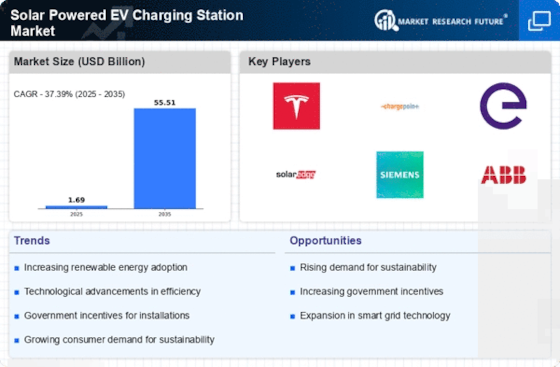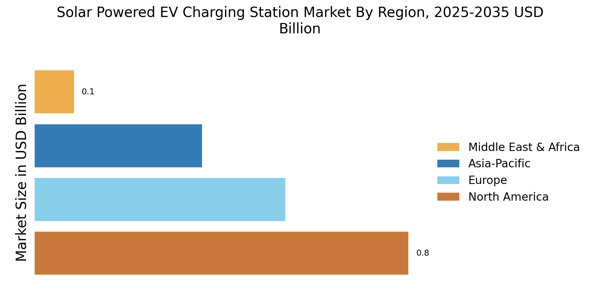Cost-Effectiveness of Solar Energy
The cost-effectiveness of solar energy is emerging as a key driver for the Solar Powered EV Charging Station Market. As the price of solar panels continues to decline, the initial investment required for solar-powered charging stations becomes more manageable for businesses and consumers. This reduction in costs is likely to encourage more stakeholders to consider solar solutions for their EV charging needs. Additionally, the long-term savings associated with solar energy, such as reduced electricity bills and lower maintenance costs, further enhance the appeal of solar-powered charging stations. As financial incentives and tax credits for renewable energy projects become more prevalent, the economic viability of solar-powered charging stations is expected to improve, potentially leading to increased market penetration.
Rising Demand for Electric Vehicles
The increasing adoption of electric vehicles (EVs) is a primary driver for the Solar Powered EV Charging Station Market. As consumers become more environmentally conscious, the demand for EVs continues to rise. In 2025, it is estimated that the number of electric vehicles on the road will surpass 30 million units, creating a substantial need for charging infrastructure. This surge in EV adoption is likely to propel the installation of solar-powered charging stations, as they offer a sustainable solution to meet the energy needs of these vehicles. Furthermore, governments are implementing incentives and subsidies to encourage EV purchases, which may further stimulate the market for solar-powered charging stations, aligning with the global shift towards renewable energy sources.
Environmental Sustainability Awareness
The growing awareness of environmental sustainability is a significant driver for the Solar Powered EV Charging Station Market. As climate change concerns escalate, consumers and businesses are increasingly seeking eco-friendly alternatives. Solar-powered charging stations align with these values by utilizing renewable energy sources, thereby reducing reliance on fossil fuels. This shift in consumer behavior is likely to influence purchasing decisions, with more individuals opting for electric vehicles that can be charged at solar-powered stations. Furthermore, businesses are recognizing the importance of sustainability in their operations, leading to investments in solar charging infrastructure as part of their corporate social responsibility initiatives. This heightened focus on sustainability may create a robust market for solar-powered EV charging stations, as stakeholders prioritize environmentally responsible solutions.
Government Initiatives and Regulations
Government policies and regulations play a crucial role in shaping the Solar Powered EV Charging Station Market. Many countries are setting ambitious targets for reducing carbon emissions and promoting renewable energy. For instance, several nations have introduced mandates requiring a certain percentage of new vehicles sold to be electric by 2030. These regulations are likely to drive investments in solar-powered charging infrastructure, as they align with sustainability goals. Additionally, government grants and funding programs aimed at expanding EV charging networks are expected to enhance the market landscape. The commitment of governments to support clean energy initiatives may create a favorable environment for the growth of solar-powered charging stations, thereby influencing market dynamics.
Technological Advancements in Solar Energy
Technological innovations in solar energy are significantly impacting the Solar Powered EV Charging Station Market. Advances in photovoltaic technology have led to more efficient solar panels, which can generate higher energy outputs even in limited sunlight conditions. This improvement in efficiency is likely to make solar-powered charging stations more viable and attractive to consumers and businesses alike. Moreover, the integration of smart technology, such as energy management systems and real-time monitoring, enhances the functionality of these charging stations. As technology continues to evolve, the cost of solar installations is expected to decrease, making solar-powered solutions more accessible. This trend may encourage wider adoption of solar-powered EV charging stations, contributing to the overall growth of the market.

















